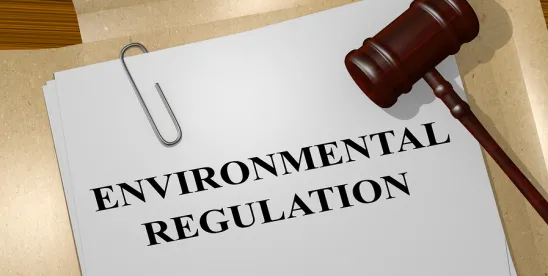On March 26, 2020, EPA issued new guidance addressing a range of issues relating to environmental compliance and enforcement during the COVID-19 pandemic. The Agency sets expectations for the regulated community to continue to comply with the law, while signaling its likely exercise of substantial enforcement discretion for pandemic-related non-compliance where regulated entities follow the conditions set forth in the policy and EPA agrees that the non-compliance is related to COVID-19.
Eligibility for the benefits of the policy depends on meeting the articulated conditions, including adequate documentation. It is advisable to plan carefully for the type of documentation that may be needed to demonstrate the reasonableness of compliance efforts and the need for any non-compliance. In our experience, this documentation may be needed months or years from now, when the federal or state lead agency ultimately makes case-specific decisions.
The policy, retroactive to March 13, 2020, covers the three most common instances of expected non-compliance: civil violations, routine compliance monitoring and reporting, and settlement agreement or consent decree obligations. The policy does not apply to CERCLA or RCRA Corrective Action sites; emergency reporting of accidental releases; imports; state or tribal matters; or criminal actions. Also, the EPA policy does not bind authorized states; states maintain their discretion to be more stringent.
General Conditions for Regulatory Compliance Requirements
Like many states that have issued enforcement discretion statements, EPA expects regulated entities to continue to achieve compliance where possible. Specifically, EPA’s policy sets forth the following expectations:
-
Act responsibly under the circumstances in order to minimize the effects and duration of any noncompliance caused by COVID-19;
-
Identify the specific nature and dates of the noncompliance;
-
Identify how COVID-19 was the cause of the noncompliance, and the decisions and actions taken in response, including best efforts to comply and steps taken to come into compliance at the earliest opportunity;
-
Return to compliance as soon as possible; and
-
Document the information, action, or condition.
In sum, EPA conditions its enforcement discretion on a demonstration that all efforts have been made to comply with environmental obligations. Where that is not “reasonably practicable” due to a COVID-19 related concern, documentation is critical. Several states describe their documentation requirements in different ways, but in all instances, documentation is necessary. Such documentation should be prepared contemporaneously with the regulatory activities at issue and held by the company for at least five years, which is the typical statute of limitations period for these types of violations.
Routine Compliance Monitoring, Reporting, and Training
EPA signals a relatively flexible approach to interruptions in regulatory compliance monitoring, reporting, and training requirements, but only where lapses are demonstrated to be due to the pandemic. For COVID-19 impacted compliance monitoring, integrity testing, sampling, laboratory analysis, training, reporting, and certification, EPA will generally not seek penalties for non-compliance where the documentation conditions described in the policy are met.
When the policy is terminated, EPA will no longer exercise enforcement discretion for future compliance issues, but does not expect to request “catch up” documentation to cover missed sampling or reporting, provided the sampling or reporting requirement applies to intervals of less than three months.
EPA also takes a practical approach to training and certification. The Agency encourages online training where possible. In documenting missed deadlines, it would be good practice to document whether online training was available. With respect to certification, EPA encourages electronic signatures even where a “wet” signature is a regulatory requirement. In keeping with this approach, the policy states “EPA believes it is more important to keep experienced, trained operators on the job, even if a training or certification is missed.”
Settlement Agreements and Force Majeure
In addition to using its enforcement discretion to forego penalizing COVID-19 driven violations, EPA will also use its discretion and not pursue violations of administrative settlement agreements. Regulated entities under administrative orders, CAFOs and the like should carefully follow EPA’s documentation guidance.
The policy indicates that it would likewise take the same approach to violations of judicial consent decrees (CDs), but the Agency is not authorized to make those decisions without collaborating with the Department of Justice (DOJ) and any co-plaintiffs, and approval from the relevant court for certain purposes (e.g., consent decree modifications). Consequently, EPA only commits in the policy to coordinating with DOJ to exercise enforcement discretion with regard to stipulated penalties for certain routine compliance obligations incorporated in CDs.
Where non-compliance with a settlement agreement or judicial consent decree is anticipated, the documentation requirements apply and the notice and force majeure procedures within the relevant agreement should be utilized.
In a rather extraordinary development, the policy permits parties to proceed as proposed in their force majeure notices unless and until they hear otherwise from the government. Although this indicates EPA’s intention to liberally consider force majeure requests, the facility continues to shoulder the risk that a force majeure request will ultimately be denied. To the extent the EPA policy conflicts with the terms of a CD for notice and agency response to a claimed force majeure event, the terms of the CD control, and there is some risk to defendants in relying on the policy over any conflicting CD terms. In addition, the policy was not jointly issued by DOJ and does not explicitly reflect Department of Justice views, even though it is likely EPA coordinated with DOJ before issuance.
Given these considerations, companies, municipalities and utilities would benefit from communicating to the government - in accordance with (or as closely as possible to) the terms of their administrative order or consent decree - that they intend to proceed with a proposed course of action in reliance on EPA’s policy. Where an administrative order or consent decree includes a state, territory or tribe as a party, coordination with such entities should also consider any state-level enforcement discretion policies and should mention reliance on the EPA policy.[1] Communicating these intentions and offering the government an opportunity to further discuss the proposed course of action may provide greater compliance and enforcement discretion certainty.
Regardless of any guidance, it is imperative to carefully review the actual force majeure provisions of each consent decree. CD language has changed over the years and some newer clauses are more demanding, requiring additional notice and procedures that may be grounds for forfeiture of the force majeure defense if not followed.
Violations of RCRA Generator Requirements
While not suspending legal requirements, RCRA hazardous waste generators may be allowed to store hazardous waste on site for periods longer than those allowed by the regulations without losing their generator status where there is a COVID-19 impact, proper labeling and storage requirements are followed, and the facility follows the documentation procedures.
This policy will allow facilities who cannot timely transfer waste off-site to maintain their generator status, rather than be treated for enforcement purposes as an unpermitted treatment, storage, and disposal (TSD) facility that has not met the rigorous TSD requirements. Under COVID-19 disruptions, EPA will also allow Very Small Quantity Generators and Small Quantity Generators to retain their status even if the waste storage exceeds the regulatory threshold.
Public Water Systems
EPA and state agencies have significant concerns about relaxing requirements that impact the public water supply, and are not relaxing these requirements, including sampling, monitoring, reporting, and laboratory analysis. However, EPA expects that there may be some COVID-19 related impacts and provides a tiering system to prioritize the most important requirements. At the top is the drinking water monitoring required by the National Primary Drinking Water Regulations, nitrate/nitrite monitoring, and Lead and Copper Rule monitoring. In addition, monitoring for any contaminants for which the system has been non-compliant should take precedence. EPA encourages the states, which have primacy for drinking water regulations, to adopt similar requirements. Some states have already issued state-specific guidance and more are expected to do so as the pandemic continues.
Imminent Threats to Human Health or the Environment
Facilities should make all efforts to avoid more serious non-compliance, such as exceedances of air emissions, water discharges, or land disposal requirements. For these types of unauthorized releases or for any non-compliance that may create an acute risk or imminent threat, immediate notice is required. For acute or imminent threats, EPA must be notified immediately and the policy lays out the appropriate next steps. For other exceedances, the implementing authority (EPA, state or tribe) should be notified.
EPA does not apply blanket enforcement discretion to these types of violations and will consider the circumstances when determining an enforcement approach.
The policy does not apply to accidental release reporting for oil, hazardous substances, hazardous chemicals, or hazardous waste, and does not provide for any enforcement discretion for these types of obligations.
New and Ongoing Enforcement Matters
While EPA states that it will continue to proceed with ongoing enforcement matters, new enforcement is expected to slow down given that EPA will generally not be pursuing COVID-19 related non-compliance. Instead, EPA will focus its attention on drinking water safety and responding to the more serious incidents of non-compliance that create an acute risk of imminent threat. This may actually have a trickle-down effect on ongoing matters by causing EPA and DOJ to heighten their focus on cases that are already farther along in the enforcement process.
EPA specifically indicates that it expects to focus on FIFRA non-compliance associated with pesticide products that claim to address COVID-19 impacts. Separately, EPA is also working to expedite its approval of COVID-19 claims for registered disinfectant products to expand the availability of those products.
State and Citizen Suit Enforcement
The policy does not reduce the ability of states to enforce violations of state environmental laws and regulations, or federal programs for which they are delegated enforcement authority. Indeed, EPA refers to state authority throughout the guidance, though the Agency “believes states should take into account the safety and health of their inspectors and facility personnel and use discretion when making decisions to conduct routine inspections, notwithstanding any applicable compliance monitoring strategy.”
We expect that some states will adopt EPA’s guidance as their own enforcement policy in response to COVID-19, while others will likely take a more rigid approach to enforcement.
Citizen groups may also begin watching more closely to determine whether there are violations that EPA would typically enforce but that are now subject to the Agency’s enforcement discretion policy.
Effective Date and Termination of Policy
The policy is temporary, and as noted above, begins retroactive to March 13, 2020. It is expected to terminate when no longer needed, but that end date has not yet been set. EPA will provide notification at least 7 days in advance of terminating the policy. The Agency says that it will issue CERCLA guidance soon.
[1] For example, Texas, Louisiana, Oregon, and California have issued their own guidance on COVID-19-related enforcement.









 />i
/>i
